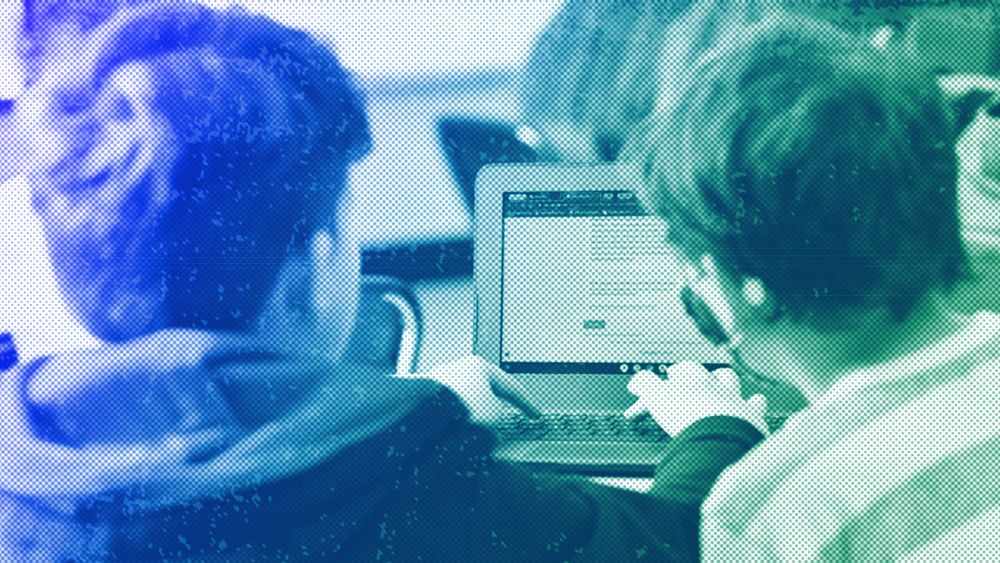
By Yoan Blanc, Co-director, C’est vrai ça?
Investing in education and the development of critical thinking is more important than ever, as it will help to limit the risks of disinformation posed by the advent of technologies such as the internet and AI, Yoan Blanc writes.
The report points out that only around half of 15-year-olds in OECD countries are able to tell facts from opinions.
With the advent of artificial intelligence (AI), more than ever, educators play a vital role in teaching the critical thinking and autonomy needed to navigate new technologies.
As we have observed in recent years, disinformation campaigns and conspiracy theories have gained ground.
While it is worrying to see the often-morbid impact of fake news, we also need to consider how susceptible people are to these theories, and the lack of education about technology, which leads some people to think that “if it’s on the Internet, it must be true”.
Pre-existing issues, a smouldering fire that just needed oxygen
A pre-existing situation has made it easier for people to buy into the idea.
Disinformation campaigns haven’t enjoyed the success they have based solely on a particular set of circumstances.
The COVID-19 crisis merely acted as a catalyst, stoking a fire that had been smouldering for quite some time due to a number of factors that slowly came to light.
As the latest RSF report shows, freedom of the press is under threat in many countries, including those that were once regarded as democratic.
Public confidence in the press has rarely been so low, and the work of journalists is often denigrated, even though they are the foundation of a healthy democratic system.
The media has become polarised in recent years, favouring ideology and punchlines over in-depth debates on social issues.
The lack of digital literacy and critical thinking
It’s hard to properly account for the surge in fake news. The general public has very little understanding of how social media work and sometimes takes falsely sourced or openly conspiracy-themed publications at face value.
Acquiring easily implemented methodological tools would undoubtedly help to avoid these pitfalls.
The main reason fake news goes viral is a lack of critical thinking. Part of the population doesn’t know how to think critically and doesn’t analyse the information they are given.
Social media is the favourite channel for spreading conspiracy theories and disinformation.
It allows for swift and massive dissemination thanks to its sharing functions and algorithms that highlight the sort of “divisive” content that generates reactions (the more intense the emotion, the more viral the information).
There is also the question of social media moderation, which is at best inadequate, at worst non-existent, and essentially based on user reports, with the impending risk of a “militia” effect.
The reports they make are processed by people who often don’t speak French, leading to bizarre situations where overtly racist content can be allowed to remain online.
Worse still, as content deletion is sometimes based on the number of reports received, journalists’ or fact-checkers’ accounts or publications are regularly deleted or suspended as a result of massive reporting campaigns.
How can we fix this?
Citizens’ initiatives that complement the work of the press need to take shape to counter fake news on social media.
Because while disinformation’s main weapon is virality, it is still possible to mitigate the viral impact of a publication by reacting quickly to provide simple, accessible, and well-sourced explanations.
C’est vrai, ça?, for instance, has over twenty volunteers working on a citizens’ initiative to check LinkedIn posts.
With an average of 10 fact-checking operations a day and 70,000 followers, they help prevent the spread of fake news or at least encourage critical thinking by providing sourced commentary.
This is where education comes in
To stem the tide of disinformation upstream, there is a solution that is both simple on paper and yet terribly difficult to implement in practice: education.
Training teachers to work with and use new technologies so that they can pass on critical thinking methods to their pupils, whether it be social media or content-generating artificial intelligence tools accessible to the general public (ChatGPT, Midjourney, etc.).
Here too, partnerships could be devised between schools and community associations to train students in the use of new technologies, to encourage them to question what they consult and to use the tools at their disposal to reflect rather than just consume.
The Internet and artificial intelligence are formidable instruments, providing access to information that was previously unavailable.
But like any other tool, they need to be properly mastered. Access to knowledge and education has always been a means of empowering people.
Whereas in the past, the challenge for the public was to gain access to the knowledge needed to contradict dogma, today, the challenge is to sort through the mass of information.
We have to invest in knowledge to solve this once and for all
Learning the basic techniques of OSINT (Open-Source Intelligence) — how to detect texts or images generated by artificial intelligence or how to analyse a source of information — are all skills that are accessible from a very young age and help protect the human mind against manipulation.
Investing in education and the development of critical thinking is more important than ever, as it will help to limit the risks of disinformation posed by the advent of technologies such as the internet and AI.
To achieve this, we need genuine political commitment and enlightened governance to analyse the risks and work together to develop effective standards that protect us all from fake news.
Yoan Blanc is the co-director of C’est vrai ça?, an independent civic initiative that brings together private citizens who want to fight back against fake news.
At Euronews, we believe all views matter. Contact us at view@euronews.com to send pitches or submissions and be part of the conversation.

